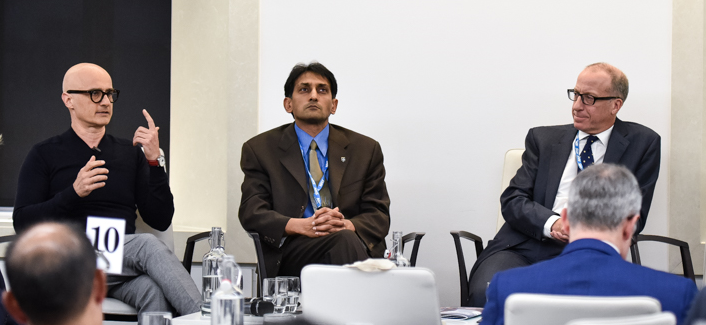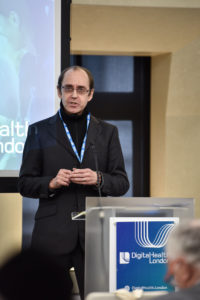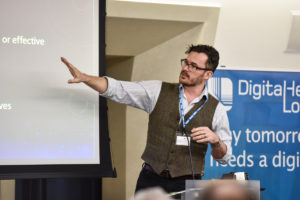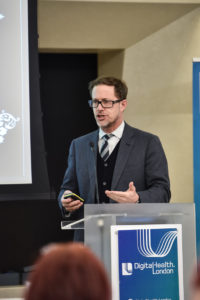Healthtech: the opportunities and the risks
Posted on
A write-up from the 2017 DigitalHealth.London/collaborate event – Why tomorrow’s patient needs a digital NHS.
By Richard Vize
Healthcare technology is liberating and empowering patients and redefining the role of the clinician. The leaders of this revolution are entrepreneurs who understand patients’ lives.
The opportunities and risks this presents were at the heart of discussions at the annual summit for DigitalHealth.London – the collaboration between the capital’s Academic Health Science Networks, MedCity and NHS England, to accelerate the adoption of digital technology across health and care for the benefit of patients and populations.
Health tech is moving from data crunching to artificial intelligence, with machines mimicking cognitive functions such as learning and problem solving. The current generation of decision-making aids will be replaced by systems that learn from the latest research and data and interrogate aspects of a condition that clinicians and patients will not have identified. Correct diagnosis will no longer depend on a skilled but fallible human.

Ali Parsa, founder of digital healthcare service Babylon, told the summit that mobile technology coupled with automated diagnosis could deliver universally accessible and affordable healthcare.
There is a global shortage of clinicians, and staff typically account for 40% of healthcare costs, so removing dependence on scarce, expensive staff is key to giving everyone access to affordable care.
“There is no solution which can fundamentally cut the costs of healthcare as long as we are reliant on humans,” Parsa said. Artificial Intelligence is gradually stripping doctors of their monopoly of knowledge – the foundation of their professional reputations and sense of self-worth. But while machines will increasingly deliver the diagnosis, clinicians are needed to put that in the context of the patient’s life history, behaviours and expectations.
“It takes someone as complex as another soul to understand that. We have not got to the point where artificial intelligence is intuitive. That is the job of the healthcare professional,” said Dr Ameet Bakhai, consultant cardiologist at the Royal Free London NHS Foundation Trust.
So future reputations will be built on the ability to unite the diagnostic power of artificial intelligence with a human understanding of a patient’s life to determine the treatment and lifestyle regime.
For the 15 million people in the UK with a long-term condition, it takes years to develop strategies to manage their health, such as finding the right diet.
Technology is already helping, such as barcodes identifying food content, but artificial intelligence offers the prospect of rapidly learning about the patient’s mind and body. For example, it could combine diet data with analysis of automated blood tests, sleep patterns and stress to help the patient build strategies which maximise their well-being.

Jonathon Hope, who has lived with kidney failure since childhood, said: “There is huge potential in artificial intelligence in [joining] those dots for us, and enabling us not to take seven or even 15 years to learn how to manage our condition but to take it down to a year or even a month. That alone would transform the healthcare system.”
Solutions need to be joined up: “When technology is brought together seamlessly, built around the patient, it enables us to manage our condition not just from a clinical point of view, but to manage our health from a whole person point of view. That holds the promise for millions of people to gain a quality of life that is unimaginable, to take control back of their lives.”

The summit demonstrated how creativity can take healthcare tech in unexpected directions. Dr Keith Grimes described how he used the immersive experience of virtual reality to distract patients undergoing painful procedures, and predicted that its power would be harnessed for end-of-life care, allowing people to go home one more time or visit a much loved place. Cheap headsets are already enabling surgeons across the globe to learn new techniques simultaneously by being immersed in an operation.
The entrepreneurs leading this revolution involve patients in every stage of design and development. This helps them understand how their app relates to changes in patients’ behaviour.
Their ideas are based on evidence rather than anecdotes and assumptions, and they use tools such as the Patient Activation Measure to assess effectiveness.

But Facebook founder Mark Zuckerberg’s approach of “move fast and break things” won’t work in healthcare. Dr Jordan Shlain, Silicon Valley physician and entrepreneur, said the mantra needed to be “move slow and don’t kill people”.
Technological innovation in healthcare is hard, because it is being grafted onto analogue systems which are resistant to change. But there are no limits on who can benefit; evidence shows that every age group will engage with technology over long periods if they have support and encouragement.
Clinicians need to embrace that, becoming digital champions who understand technology options and coach patients in building their personal strategies.
But millions of patients won’t wait for their clinicians to catch up. As Dr Mary Black, head of digital strategy at Public Health England, put it: “A militant army of activated patients know this stuff well and are getting on with it. Clinicians are no longer the voice of God”.
Read a takeaway summary of key messages from DigitalHealth.London/collaborate here
Check out DigitalHealth.London/collaborate’s Storify



